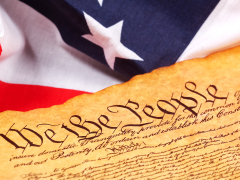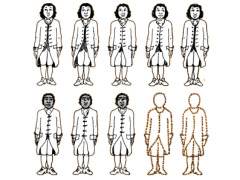A rich person who keeps too much surplus is like a theater goer who goes early and takes too many seats in the theater. Here Aquinas offers a second objection to private property based on St. Basil.
This is a continuation of my commentary on Thomas Aquinas’s views of private property in Article 2, Question 66 of Summa Theologiæ. ST II-II, 66, 2 [ST 2a2æ 66, 2]. The posts in sequence are: 1) Article 1 Text and Commentary 2) Article 2 Text and Prologue 3) Objection 1 to Private Property 4) On relationship of Natural Law and Human Law 5) Objection 2 to Private Property (this post) 6) Objection 3 to Private Property 7) Aquinas’s Views of Private Property 8) The First Human Competence: Care and Commerce 9) The Three Reasons Private Property is Necessary 10) The Second Human Competence 11) Reply to Objection 1: All Things in Common 12) Reply to Objection 2: Analogy of the Theater 12) Reply to Objection 3: Over consumption is robbery
Objection 2: Further, Basil in expounding the words of the rich man quoted above (Article 1, Objection 2), says: “The rich who deem as their own property the common goods they have seized upon, are like to those who by going beforehand to the play prevent others from coming, and appropriate to themselves what is intended for common use.” Now it would be unlawful to prevent others from obtaining possession of common goods. Therefore it is unlawful to appropriate to oneself what belongs to the community.
Aquinas now poses his second objection to private property from the homily of St. Basil. Aquinas had appealed to this same homily of Basil previously in Article 1 to challenge the idea that one can naturally possess things. Here he uses the same homily to challenge the idea that one can have private property. In this case, he invokes Basil’s analogy of the theatre, which is meant to be an illustration that one should not take more seats in a theatre than one needs, just as it would be “unlawful” to prevent others from taking what they need from the commons.
Basil’s theatre analogy, we recall, was invoked in his commentary on the parable of the rich fool (Luke 12:18) who had a plentiful harvest and built new storehouses to handle the abundance. Basil’s point was that hoarding is wrong because one keeps more than what one needs and thinks that “first-come, first-served” justifies taking as much as what one wants from what is common. The rich fool, Basil reminds his audience, mistakenly attributes abundance in his crop to his own labor and not God.
Basil’s position could be interpreted to affirm the distinction between “taking possession” and having “private property.” One can take what one needs (from nature for food, or at the theatre), but one can’t take more than what one needs (abundance of crop and too many seats at the theatre). Thus Basil seems to hold the view that possession for what one needs is natural but private property or taking too much from the common is unnatural or unlawful.
Third Objection to Private Property




